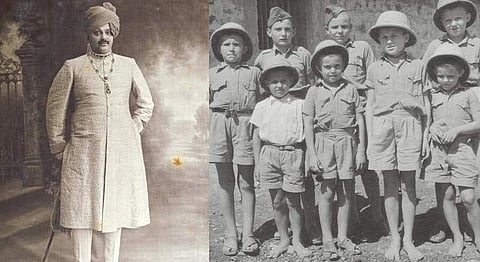
- HOMEGROWN WORLD
- #HGCREATORS
- #HGEXPLORE
- #HGVOICES
- #HGSHOP
- CAREERS
- ABOUT US
- CONTACT US

India is known to have a reputation of being a helpful and friendly nation, having a very inclusive culture. We have a glorious past which has shown how Indian contribution has played a significant role in protection of people to the liberation of nations. It has always opened doors to everyone who came at her doorstep, and made them a family. Even today, we have so many refugees who have sought shelter on the Indian soil, and we as a country, have treated them as ours, providing them with basic necessities of food, clothes and shelter, to basic civil rights.
Even when India was fighting for its own freedom struggle, when she herself was getting wounded as she fought against the British Rule, she helped many nations who asked for help. One such nation was Poland.
The beginning
On 1st September 1939, Hitler invaded Poland, marking the beginning of World War II. Starlin attacked the remaining of Poland on 17th September 139, forcing the Poles to run out of their motherland. The country was torn apart by destructive forces, some people were already taken as labourers by USSR, held captive in concentration camps and some were a part of Poles Army fighting against Hitler, leaving so many children orphaned. Overcoming grave obstacles and challenges, the remaining civilians, around 500 refugees, women, police and 200 children were filled in the ship and the captain was asked to take them to any country that gave them shelter.
Thus began the journey of toughest human endurance and suffering. Many of them lost their lives on the way due to malnourishment, dehydration, cold and hunger. They went from place to place begging for refuge and shelter; Turkmenistan, Iran, Afghanistan, Pakistan, but were denied by all even to land.
To the rescue
Finally, the wandering boat came across the western coast of India, in Mumbai. But the then British governed India, The governor denied refuge to these people. But Maharaja Digvijay Singh Jadeja of Jamnagar, Gujurat, heard their plight. He being the king of a princely state, the Chancellor of the Council of Princes and also the Member of the Imperial War Cabinet in British India, forced the governor to accept these refugees threatened with annihilation. Frustrated by the lack of empathy, the ship was finally docked at the Rosi port, Gujurat.
Finally, malnourished and exhausted, the Polish People got a warm welcome in India. The king assured the people of their safety and told them, that they were not orphans but his own children, they were not foreigners or refugees, but Nawaganaris. He built tent accommodations for the children. Proper care was taken about their food. So he made arrangements of not only their proper refuge, but also provided the children with proper education at Balachiri Army School for free. Due to obstruction by the British, he made adoption certificates for all of them. He went great lengths to make that place a home for them.
They all stayed here for nine years, before they were united with their surviving loved ones. It is considered as the most life changing experience of their life.
The Present
One of the refugees later went on to become one of the Prime Minister’s of Poland. In Warsaw, Poland’s capital, many roads and schemes are named after King Digvijay Singh, every year an article does come out on him and his noble deeds. Some of the descendants of the refugees visit Jamnagar every year in remembrance of their ancestors and the great king. He was awarded the Commander’s Cross of the Order Of Merit by the President.
His gesture went on to open many hearts and shelters for the war victims, other refugees all over the world. It also spoke volumes of the generosity and compassion the Indian hearts held towards everyone, who provided all with maximum aids they could provide. Even they themselves were suffering from years of famine, drought, hunger, death. But they made sure that they helped with their full assistance. They stayed true to their culture which believes in “Atithi Devo Bhava ( Guest is God)”.
If you enjoyed this article, we suggest you read:
